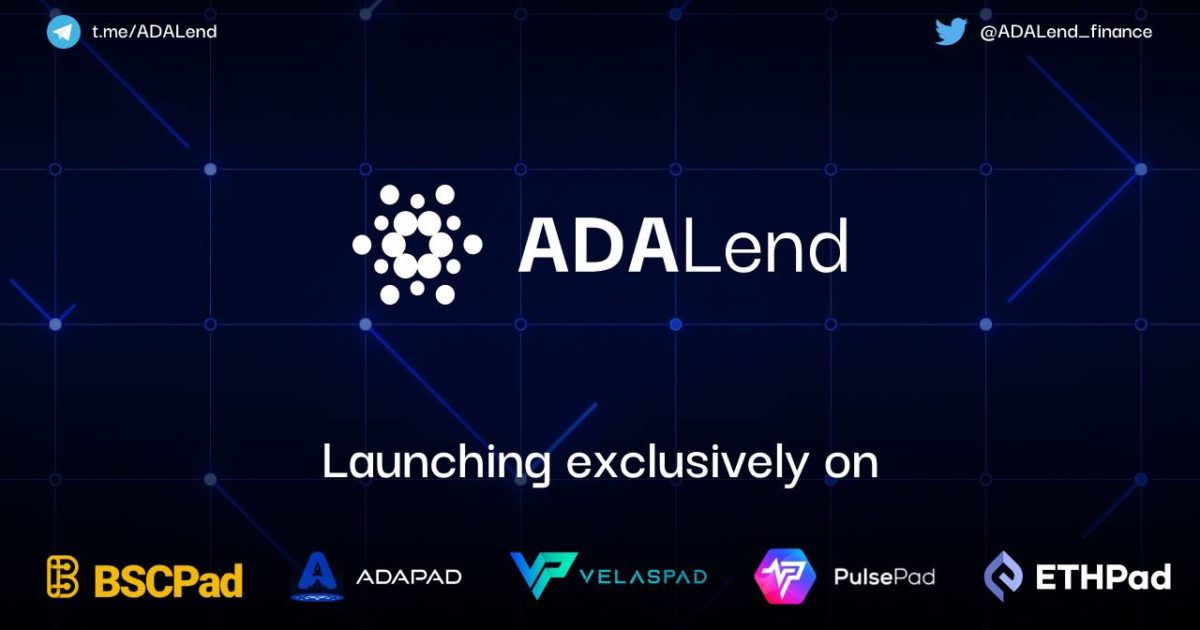sponsored
BSCPad and ADAPad Public Sale On March 14th.
Cryptocurrencies and DeFi are experiencing a period of blistering growth:
- The total value locked (TVL) of tokens in DeFi protocols rose 357% to $255.39 billion among all blockchains.
- Over $2.5 trillion in cryptocurrencies was traded in January 2022 alone.
- Global crypto market cap is now over $2 trillion.
Within the space, crypto lending has become the most dynamic niche. Over $35 billion TVL is in DeFi lending protocols, which is dominated by Ethereum with a 54% share of TVL as of January 2022. The problem is that Ethereum is slow, expensive, and lacks scalability:
- Ethereum can only manage 10 to 15 transactions per second, which means orders pile up faster that they can be posted and are delayed.
- Gas costs when demand is high can be exorbitant, reaching over $50 per transaction on average in January 2022.
- Ethereum’s market share is rapidly eroding after peaking at 97% in January 2021, as developers and crypto investors flock to more flexible and versatile blockchains.
To permanently solve DeFi’s challenges, AdaLend has developed a user-friendly, scalable, and fully decentralised Layer-1 platform for instant loan approval, automated collateral, trustless custody, and augmented lending liquidity. Built on the leading proof-of-stake (POS) Cardano blockchain, AdaLend aims to unleash the next generation of seamless, fast, and secure crypto lending.
The features of AdaLend are both innovative and powerful:
A Unique Architecture – The AdaLend protocol aims to improve the efficiency of capital flows, managing several lending pools via the native $ADAL token. Each pool has several key components: liquidation model, utilization ratio, and borrowing/lending interest rate. The protocol provides tokenization for deposited assets, transferring the ownership of lending positions between users automatically.
Incentivised Liquidity – DeFi lending protocols need to attract Liquidity Providers (LPs) to stake assets in pools to enable lending. AdaLend does this by offering LPs strong incentives and APY to deposit assets and boost lending liquidity.
Flexible Lending Options – All lending in AdaLend is permissionless, trustless, and can be done on any token pairing. The protocol’s governance ensures that the best offers are available and that only the safest oracles are used to determine pricing and rates.
Decentralised & Democratic Governance – All $ADAL token holders can participate actively in the governance of AdaLend, voting on proposals and determining the future evolution of the platform. The AdaLend DAO creates a democratised, open access, and fully transparent financial ecosystem geared to scale globally.
Idle Asset Optimisation – AdaLend minimises the utilization ratio for non-stable coins and maximises token circulation, achieving a double goal – maintaining high liquidity levels for protocol users, and offering attractive lending rates for borrowers. In addition, AdaLend also minimises idle assets on the platform by shifting them to stable swap platforms. This means that users with tokens in cold storage can now use them to support the AdaLend protocol, earning additional rewards in the process.
The capabilities of the Cardano blockchain are the magic fuel that powers AdaLend’s long-term expansion plan.
Why Cardano? AdaLend’s Competitive Edge
Cardano is a versatile, scalable, and cost-effective Blockchain, ideal to build a next generation crypto lending platform. Created by Ethereum Co-Founder Charles Hoskinson in 2017, it is a Proof of Stake (PoS) chain where code updates are rigorously peer-reviewed. Cardano’s advantages are clear:
Efficiency – Cardano is 47,000x more energy-efficient than Bitcoin, leading the space as an environmentally friendly blockchain.
Scaleability – Cardano can process 250 TPS, with estimates that it will be able to reach eventually 1 million TPS.
Cost-Effectiveness – Cardano’s fees are currently about $0.35 per transaction, over 100x times lower than Ethereum.
Growing Traction – Interest and investment in Cardano has been rising consistently, with TVL reaching $133.39 million as of March 2nd, a new all-time high, and the number of wallets holding Cardano’s native currency ADA recently surpassing the three million mark
Until now, Ethereum-based platforms like Aave have dominated the DeFi lending space. This is changing fast, as the DeFi market is looking for faster, cheaper, and more scalable solutions.
AdaLend is this solution, and investors are recognising it. The September 2021 private sale sold out 1.8 Million ADAL tokens, raising $540,000, in less than one hour. AdaLend will be now be conducting a public sale on five launchpads (BSCPad, VelasPad, PulsePad, ADAPad, and ETHPad) on March 14th, to finance its growth plans. These are the most popular launchpads among investors, and allow to buy $ADAL tokens pre-sale at a discounted price. Once the $ADAL token is listed, it will trade in the major crypto exchanges connected to the launchpads, accessing immediate liquidity and visibility. With its unique features, unprecedented capabilities, and embedded scalability, AdaLend is ready to unleash the new era of DeFi lending.
This is a sponsored post. Learn how to reach our audience here. Read disclaimer below.
Image Credits: Shutterstock, Pixabay, Wiki Commons
Disclaimer: This article is for informational purposes only. It is not a direct offer or solicitation of an offer to buy or sell, or a recommendation or endorsement of any products, services, or companies. Bitcoin.com does not provide investment, tax, legal, or accounting advice. Neither the company nor the author is responsible, directly or indirectly, for any damage or loss caused or alleged to be caused by or in connection with the use of or reliance on any content, goods or services mentioned in this article.




